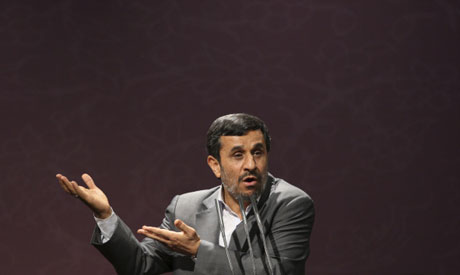
Iranian President Mahmoud Ahmadinejad, (AP).
Iranian President Mahmoud Ahmadinejad has cautiously welcomed a Russian proposal for bringing Iran back to talks over its nuclear program, the official news agency reported Thursday.
The proposal calls for the international community to make limited concessions to Iran for each step it takes in meeting demands to clarify the nature of its nuclear program.
The West suspects Iran is pursuing a nuclear weapons capability under the cover of a civilian nuclear energy program. Iran denies the accusation and says its work is only for peaceful purposes like electricity generation.
"They have proposed step-by-step cooperation with Iran in the nuclear field," the IRNA news agency quoted Ahmadinejad as saying. "All right, we have taken our step and cooperated with the U.N. nuclear watchdog. Now, you take your step and come to prepare a plan together. And you take one step; we take a step, too."
Ahmadinejad repeated Iran's assertion that it is not after nuclear weapons, and that its missile program is not a threat to Europe.
Earlier this month, U.S. Secretary of State Hillary Rodham Clinton said the Obama administration would study the Russian idea and would send a team of experts to consult with the Russians about their plan.
The last round of talks on the issue were held in January but made no progress. Besides Russia and the U.S., the other nations taking part in the talks with Iran are Britain, France, China and Germany.
The U.N. Security Council has imposed four sets of sanctions over Tehran's refusal to halt uranium enrichment, a key element of its disputed nuclear activity. That process is of concern because it can be used both to produce fuel for power plants and material for nuclear weapons.
Iran's foreign minister said last week his country was ready to cooperate more closely with the International Atomic Energy Agency but only if it cancels its investigation into allegations that Tehran has secretly worked on a nuclear weapons program — a condition rejected by the head of the U.N. nuclear watchdog.
The agency has accused Iran of stalling the investigation for years.
Foreign Minister Ali Akbar Salehi said after meeting the IAEA chief in Vienna on July 12 that Iran was ready to work "closer than ever before" with U.N. nuclear agency, if it first ends the investigation.
Iran argues it has cooperated and answered all questions mandated by the plan governing the probe.
Short link: